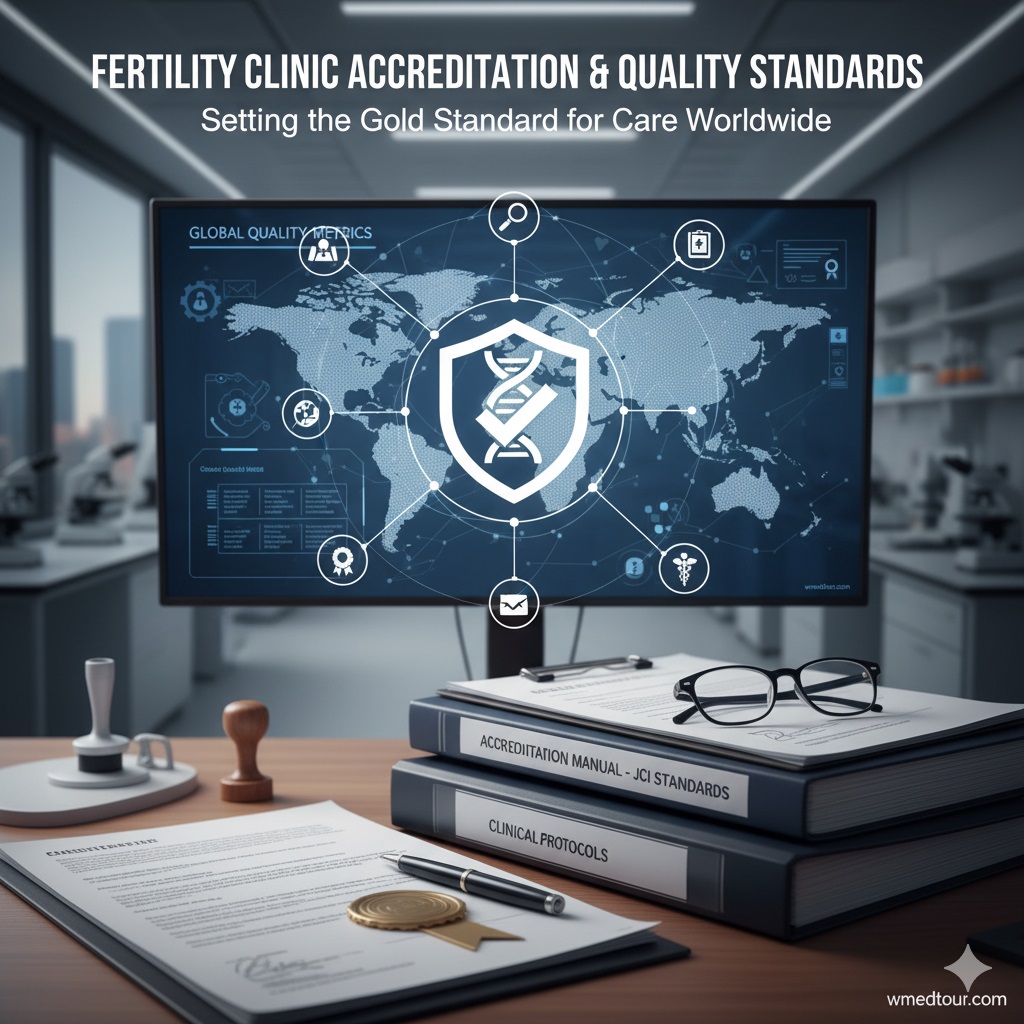✨Fertility Clinic Accreditation & Quality Standards: Trust, Safety & Excellence in Reproductive Care
📝Executive Summary: Navigating Trust in Fertility Treatment
Choosing a fertility clinic is one of the most significant decisions an individual or couple can make. The presence of robust *Fertility Clinic Accreditation & Quality Standards* directly correlates with the safety, ethical practice, and ultimate success of treatments like IVF, ICSI, and Egg Donation. This in-depth guide is designed to empower you, our audience—whether you are prospective patients or industry professionals—with the critical knowledge to assess a clinic’s commitment to excellence. We will explore the global landscape of accreditation bodies, dissect what high-quality standards truly entail, and provide a clear framework for evaluating a clinic’s adherence to the highest benchmarks of safety and success. Understanding these standards is not just about paperwork; it is about securing your peace of mind on your fertility journey. Furthermore, for those considering fertility treatments abroad, we highlight the vital role accreditation plays in ensuring consistent, world-class care, regardless of location.
🌍The Global Importance of Fertility Clinic Accreditation & Quality Standards
The field of reproductive medicine is rapidly evolving, a reality that makes adherence to rigorous *Fertility Clinic Accreditation & Quality Standards* more critical than ever. As technology advances—from sophisticated Preimplantation Genetic Testing (PGT) to innovative AI-driven IVF methods—so too must the oversight. Accreditation is essentially an external validation that a clinic meets predefined criteria for clinical performance, laboratory quality, patient safety, and ethical practice. Consequently, it shifts the power back to the patient, enabling them to make an informed, trust-based decision.
However, it is vital to note that not all accreditations are equal. Therefore, prospective patients, especially those engaging in fertility medical tourism, must look beyond simple claims and scrutinize the actual bodies providing the certification. A high-quality accreditation program involves regular, on-site inspections, thorough documentation review, and an assessment of patient outcomes data. Thus, the presence of specific, internationally recognized standards signifies a profound commitment to excellence, which is a key indicator of where to find the best care.
🏆Key International Accreditation Bodies and Their Focus
To demonstrate world-class adherence to **Fertility Clinic Accreditation & Quality Standards**, clinics often seek certification from global, non-governmental organizations. These bodies establish benchmarks that transcend local regulations, ensuring a consistent level of care. Consequently, understanding the focus of each is instrumental when you are vetting a potential clinic.
⚕️JCI: Joint Commission International
JCI is perhaps the gold standard in global healthcare accreditation. Its focus is comprehensive, covering everything from patient safety goals to infection control and facility management. It is a rigorous process, often signifying a clinic’s dedication not just to fertility-specific quality, but to overall hospital-level excellence. Consequently, a JCI-accredited fertility clinic has demonstrated compliance with extremely demanding international standards. JCI Official Website
Pros of JCI Accreditation:
- Global Recognition: Offers immediate credibility, particularly for international patients.
- Broad Scope: Covers the entire facility, including surgical areas, laboratory, and patient administration.
- Focus on Patient Safety: Strong emphasis on reducing risks and improving quality of care.
Cons of Solely Relying on JCI:
- General Healthcare Focus: Not exclusively fertility-focused, meaning specific embryology protocols may require additional verification.
- High Cost: The expense can sometimes deter smaller, high-quality clinics from applying.
🔬CAP: College of American Pathologists (For Laboratory Quality)
While often associated with the USA, CAP accreditation for a laboratory is globally sought after. In the context of fertility, this specifically addresses the embryology and andrology labs—the heart of any IVF center. CAP standards ensure the accuracy of testing, the competency of lab staff, and the quality of the environment where gametes and embryos are handled. Since lab quality directly impacts success rates, CAP is a crucial benchmark. It’s truly a must-have for clinics serious about adhering to high **Fertility Clinic Accreditation & Quality Standards**.
🇪🇺ESHRE: European Society of Human Reproduction and Embryology
ESHRE is an academic and scientific body that sets clinical practice guidelines and runs certification programs, often focusing on quality management systems specific to reproductive medicine. Their standards are highly specific to the ethical, clinical, and laboratory practices within fertility. Moreover, their regular publications and guidelines shape best practices across Europe and beyond. ESHRE Official Website
🇺🇸ASRM: American Society for Reproductive Medicine
Similar to ESHRE but focused primarily on the North American context, ASRM sets crucial ethical and clinical guidelines. While not a direct accreditation body in the same way as JCI, adherence to ASRM guidelines is a strong indicator of a clinic’s commitment to scientific and ethical standards. Many non-US clinics voluntarily adopt their protocols to attract international patients.
🔑Dissecting Quality Standards: Beyond the Certificate
Accreditation is the certificate; quality standards are the daily practice. Therefore, it is essential to understand what these high-level standards mean in tangible terms. Indeed, the most trustworthy clinics live and breathe these principles, which directly influence patient experience and outcomes. This deep commitment to **Fertility Clinic Accreditation & Quality Standards** separates the truly excellent centers from the mediocre ones.
📈Clinical and Outcome Excellence
- Success Rate Transparency: Clinics must publish verifiable success rates, typically audited by a third party. However, patients must also be wary of misleading statistics (e.g., only reporting success for young, low-risk patients). Thus, always ask for success rates broken down by age, diagnosis, and treatment type.
- Standardized Protocols: A high-quality clinic follows evidence-based clinical practice guidelines for all treatments, including ICSI, PGT-A, and ovarian stimulation. Furthermore, they should adapt protocols based on the patient’s specific profile, a practice known as individualized medicine.
- Minimizing Multiple Gestations: A key quality indicator is the appropriate use of Single Embryo Transfer (SET) to reduce the high risks associated with twins or triplets. PGT-A screening often aids in this, allowing for the confident transfer of a single, chromosomally normal embryo.
🛡️Patient Safety and Risk Management
Safety is paramount, especially when navigating complex procedures. A major component of robust **Fertility Clinic Accreditation & Quality Standards** is an active, transparent safety culture. Since medical procedures always carry inherent risks, the focus is on proactive mitigation.
- Infection Control: Strict protocols are essential in the lab and operating room environments to prevent contamination.
- Witnessing and Identification: The process of checking patient and sample identity (gametes, embryos) must be meticulously enforced—often using electronic witnessing systems—to prevent mix-ups. This is a non-negotiable safety measure.
- Ovarian Hyperstimulation Syndrome (OHSS) Prevention: Clinics should employ modern strategies, like GnRH-agonist triggers, to reduce the risk of OHSS, a potentially serious complication of IVF.
⚖️Ethical and Legal Compliance
Reproductive technology often treads into complex ethical territory. Therefore, a fully accredited clinic must demonstrate unwavering adherence to ethical guidelines, particularly concerning donor programs and genetic testing. Ethical guidelines on gender selection and informed consent, for example, must be strictly followed. Additionally, for international patients, clinics must comply with both local laws and, ideally, international ethical standards.
We, at WMEDTOUR, place enormous value on ethical compliance. Consequently, we ensure our partner clinics adhere to global standards, including clear policies on embryo storage, disposal, and the legality of specific procedures in their jurisdiction.
🔍Who is This For? Understanding Your Stake in Accreditation
This information is vital for several groups of people navigating the world of reproductive health.
👨👩👧👦Prospective Parents and Individuals
If you are planning to undergo fertility treatment, whether locally or considering IVF abroad, this knowledge is your protective shield. You are investing significant emotional and financial resources; thus, verifying the **Fertility Clinic Accreditation & Quality Standards** of your chosen center is an absolute necessity. You need to know that your future family is in the safest hands possible. Furthermore, for those seeking specific services like fetal gender selection, ensuring the clinic follows rigorous PGT protocols is essential for both accuracy and ethical compliance.
💼Medical Tourism Facilitators and Professionals
As a medical tourism professional, your reputation hinges on the quality and safety of the providers you recommend. Therefore, vetting clinics for stringent **Fertility Clinic Accreditation & Quality Standards** is the core of your due diligence. You must navigate the varying global medical treatment regulations and ensure that, for instance, a clinic in Turkey or Iran meets the same level of care as one in Germany. This is critical for patient safety and legal compliance, especially concerning services like gender selection methods.
👩⚕️Clinical Staff and Administrators
For those working within fertility centers, accreditation is your roadmap to continuous improvement. It provides a standardized framework for training, protocol development, and performance measurement. By adhering to these standards, you are not only ensuring compliance but also actively contributing to the clinic’s success rates and reputation for excellence.
⚖️Pros and Cons of Choosing an Accredited vs. Non-Accredited Clinic
The choice between an accredited and a non-accredited clinic is not merely a formality; it has tangible implications for your journey. While a non-accredited center might seem appealing due to potentially lower IVF costs, this comparison table highlights why the short-term saving may lead to long-term disappointment or, worse, safety issues.
| Feature | Accredited Clinic (High Standards) | Non-Accredited Clinic (Lower Oversight) |
|---|---|---|
| Patient Safety & Risk Management | Pros: Mandatory protocols for infection control, electronic witnessing, and OHSS prevention. Verified adherence to **Fertility Clinic Accreditation & Quality Standards**. | Cons: Protocols may be informal or outdated. Higher risk of procedural errors and safety incidents. |
| Laboratory Quality (Embryology) | Pros: External validation (e.g., CAP or ISO) ensures equipment calibration, staff competency, and optimal culture conditions, directly impacting embryo development. | Cons: No independent verification of lab environment, media quality, or staff proficiency, leading to lower fertilization and embryo viability rates. |
| Ethical and Legal Compliance | Pros: Clear, ethically-reviewed policies on donor anonymity, consent, and storage. Compliance with international and local reproductive law. | Cons: Ethical ‘gray areas’ are more likely, potentially exposing patients and the clinic to legal or moral complications later. |
| Cost vs. Value | Pros: Higher initial cost, but significantly greater chance of success on the first attempt, resulting in a lower overall cost/baby born. | Cons: Lower initial cost, but often necessitates multiple failed cycles, making the total expenditure higher and emotionally draining. |
| Medical Tourism Suitability | Pros: Provides a universally understood measure of quality, simplifying the clinic selection process abroad. | Cons: High risk due to lack of local knowledge and difficulty verifying unproven claims from a distance. |
Therefore, we strongly recommend prioritizing clinics that meet recognized **Fertility Clinic Accreditation & Quality Standards**, even when exploring affordable options like those in India or Turkey. Quality and affordability can coexist, but only when quality is verified through accreditation.
📚Case Study: Sarah & Mark’s Journey to Accredited Care
The Challenge: The Illusion of Low Cost
Sarah (38) and Mark (40) had been trying to conceive for four years. They researched IVF treatment options abroad. Initially, they were drawn to “Clinic X,” which offered IVF for significantly less than their home country’s average. Clinic X was not internationally accredited, claiming instead to adhere to “local standards,” but their online marketing showed impressive, yet unsubstantiated, success rates.
The Setback: The Unforeseen Consequence
They traveled and underwent one full IVF cycle at Clinic X. Unfortunately, the cycle failed. Moreover, the experience was unsettling: communication was poor, they were given limited information about their embryo quality, and their doctor was vague when questioned about the laboratory’s certification. Crucially, the clinic couldn’t produce any independent audit of their lab practices.
The Turning Point: Prioritizing Verified Quality
Feeling defeated, they contacted WMEDTOUR, which guided them towards “Clinic A,” a center that proudly held JCI and CAP accreditation. Though the cost was slightly higher than Clinic X, Clinic A openly shared their audited success rates, detailed their protocols for PGT-A, and immediately provided an informational packet on their **Fertility Clinic Accreditation & Quality Standards** compliance.
The Outcome: Success through Standards
At Clinic A, they underwent their second cycle. The transparency was night and day. They observed electronic witnessing of their samples, received daily, detailed updates from a certified embryologist, and the clinical team proactively managed Sarah’s ovarian response. They successfully transferred a single, PGT-A tested embryo. Nine months later, Sarah gave birth to a healthy baby girl. Their final reflection: the cost difference was negligible compared to the emotional cost and lost time of the failed, unaccredited attempt.
This journey underscores a vital truth: **Fertility Clinic Accreditation & Quality Standards** are not bureaucratic hurdles; they are the foundation of safe and effective reproductive care. For individuals seeking to understand the medical and administrative process, reviewing key resources like the pre-travel resources checklist is essential.
🌐The Role of Accreditation in Medical Tourism for Fertility
Medical tourism is a growing option for fertility treatment seekers, offering access to high-quality care often at a lower cost. However, the geographic distance necessitates an even stronger reliance on **Fertility Clinic Accreditation & Quality Standards**. When you cannot physically tour the clinic or easily check local regulatory compliance, international accreditation becomes your primary guarantee.
✈️Ensuring Continuity and Transferability of Care
Accredited clinics typically use standardized medical records and protocols. This is immensely beneficial for the international patient who may need follow-up care or who may be using a procedure like IVF for family balancing and requires post-treatment monitoring back home. The established, documented protocols make it easier for a home-country physician to understand the treatment that was administered.
🔒Protecting Your Rights and Investment
Accredited centers are more likely to have clear, internationally accepted policies on patient rights, complaints procedures, and financial transparency. Furthermore, their accreditation status requires them to maintain certain levels of liability and professional indemnity, offering an additional layer of financial protection for the patient. Consequently, the accreditation serves as a form of global consumer protection in the healthcare space.
Additionally, patients should always review information on fertility treatments pre-travel checklist and confirm the necessary medical travel regulations to ensure a smooth and legal journey.
💡Future Trends in Fertility Quality Assurance
The commitment to **Fertility Clinic Accreditation & Quality Standards** is not static; it evolves with science. The future of quality assurance in reproductive medicine is moving toward even greater precision and oversight.
- AI and Quality Control: Artificial Intelligence is increasingly being used to grade embryos, select the best sperm, and optimize lab conditions. Accreditation bodies are developing standards to audit these AI-driven systems, ensuring they improve, not compromise, human-led decision-making. Harvard Medical School Research on AI in Fertility
- Non-Invasive PGT (niPGT): This cutting-edge technique aims to test the embryo without the need for a biopsy. Accreditation standards will soon need to incorporate guidelines for the validated use and reporting of niPGT, ensuring accuracy is maintained even as invasiveness is reduced.
- Mental Health Integration: Future accreditation standards are expected to place greater emphasis on mandated psychological and emotional support for patients, recognizing the profound mental toll of infertility treatments. Comprehensive patient support should be viewed as integral to overall quality. NIH Study on Fertility Treatment and Mental Health
❓Frequently Asked Questions (FAQ)
We’ve compiled answers to the most common, non-interactive questions about **Fertility Clinic Accreditation & Quality Standards**.
What is the primary difference between a license and accreditation for a fertility clinic?
A license is the minimum legal requirement granted by a government to operate a clinic. Accreditation is a voluntary, external review that assesses a clinic against higher, more comprehensive quality and safety standards, signifying excellence beyond basic legal compliance.
Does a high success rate guarantee a clinic has good accreditation?
No. While accreditation often leads to better outcomes, a high success rate alone does not confirm quality standards. Some clinics manipulate statistics (e.g., only treating low-risk patients). Always look for an audited, transparent success rate alongside international accreditation.
How often do accredited fertility clinics undergo re-evaluation?
Most major international accreditation bodies, like JCI, require a comprehensive on-site survey and re-accreditation process every three years. However, accredited clinics must perform continuous internal monitoring and reporting throughout the period.
What specific standards apply to embryo freezing and storage?
Accreditation standards mandate strict protocols for cryopreservation, including regular monitoring of storage temperature (liquid nitrogen levels), clear identification systems, backup power, and a comprehensive consent process for the duration of storage and eventual disposal/use of embryos and gametes.
Can a single doctor be accredited, or is it only the clinic?
Accreditation generally applies to the entire facility, the system, and the processes (the clinic). Doctors hold board certifications or specialist registration, but the clinic’s accreditation covers the environment, lab, and collective protocols of the whole team.
What are the risks of using a non-accredited clinic for specialized procedures like fetal gender selection or PGT?
The risks are high, including inaccurate PGT results (leading to transfer of an abnormal embryo or incorrect gender), ethical breaches, lack of proper genetic counseling, and potential non-compliance with international regulatory requirements for genetic screening.
If I am a medical tourist, how can I verify a clinic’s accreditation from abroad?
Always verify the status directly on the official website of the accreditation body (e.g., JCI, CAP, ESHRE). Do not rely solely on the clinic’s website. You can also contact trusted facilitators like WMEDTOUR who maintain up-to-date verification records.
Are ISO certifications relevant for fertility clinics?
Yes, ISO 9001 (Quality Management) is relevant as it certifies a clinic’s management system, ensuring consistency in service delivery. While not specific to clinical outcomes like JCI or CAP, it supports the operational quality necessary for high clinical standards.
What should I look for regarding physician and embryologist qualifications in an accredited clinic?
The accreditation process audits staff credentials. You should seek physicians who are board-certified in Reproductive Endocrinology and Infertility, and embryologists certified by recognized professional bodies like the American Board of Bioanalysis (ABB) or equivalent European/local boards.
What is the importance of a transparent error reporting system in an accredited clinic?
Accredited clinics are required to have a non-punitive system for reporting errors or near-misses. This is crucial because it allows the clinic to learn from mistakes and proactively implement changes to prevent recurrence, thereby continually enhancing patient safety.
Does accreditation cover the psychological support provided to patients?
Increasingly, yes. Modern **Fertility Clinic Accreditation & Quality Standards** include elements of patient-centered care, which mandate the availability of licensed mental health professionals for counseling and support before, during, and after treatment, recognizing infertility as a major life stressor.
How does accreditation address the process of pre-conception gender selection?
Accreditation ensures that if gender selection is legally and ethically performed (usually for medical reasons to prevent a gender-linked disease, or for legally permitted family balancing), the clinic provides mandatory, non-directive counseling and uses validated PGT techniques with strict adherence to ethical guidelines.
Internal Link for SEO
Internal Link for SEO
Internal Link for SEO
Internal Link for SEO
Internal Link for SEO
Internal Link for SEO
Internal Link for SEO
Internal Link for SEO
Internal Link for SEO
Internal Link for SEO




